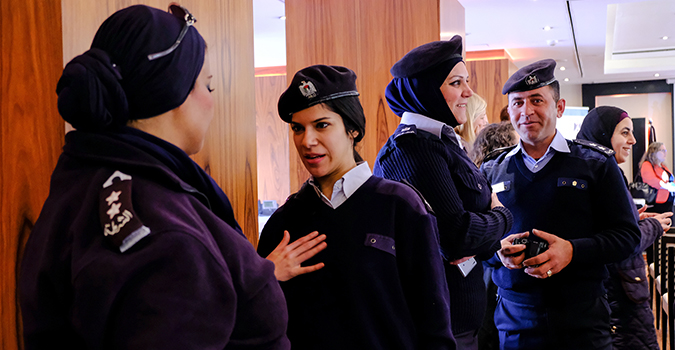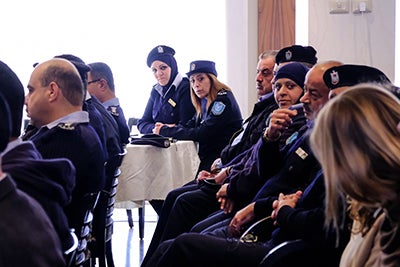Palestinian police take new steps to widen career opportunities for women in the police
Date:

At the launch ceremony of the Palestinian Civil Police (PCP) gender strategy, the atmosphere remains obviously masculine, with far more men than women in the audience wearing the uniform. Still, as police women and men interact and congratulate each other, the feeling that police officers happily embrace this change is palpable.
"It is still challenging for people because this appears as a new and unclear concept but if you explain they do understand and change their perceptions" explains Muhammad, one of the police gender coordinator in districts, who play a key role in community outreach on women’s security issues as well as internal awareness raising within the police. “Women can do the same work as a man in the police, but either way, women must be part of the police because we cannot leave aside half of the society.”
At just over 3 per cent, there is still a long way to go to reach the global average of 10 per cent women representation in the police and to provide the diversity that leads to improved citizen security, especially for women. More women have however started joining the police, reflecting a change within both police and society towards the role of women in security institutions.

The issue is however not only confined to numbers, but also to female representation in the different departments and levels. “Time has come for women to be represented at the decision-making level in the police” says Zahara, another police gender coordinator. But she also confesses that women, as she did, often prefer to hold administrative positions than work in the field, with direct implications on their careers. “If women remain out of the field, they will not reach this higher level” she says, “men often see themselves entitled to a position because they have been working in the field and therefore deserve it better. For a woman with children, it will be more difficult. In offices, you have clear working hours, while in the field it is less predictable.”

As evidence of this commitment, the police have already started the implementation of the strategy; for example, key departments have integrated it in their plans and the gender unit has initiated an assessment of infrastructure to improve the working environment for women.
“If there had been a gender strategy when I first entered the police, I don’t think I would have had followed the same path” tells Zahara, “I would have considered other directions, such as the national guard, or specific field positions with the traffic department or criminal investigation.”
Zahara entered the police at a time when few women were even considering policing as a possible or acceptable career path. Eighteen years later, and with a gender strategy pushing boundaries and supporting her ambitions, Zahara says proudly: “I have started to feel the change and it encourages me to continue. There are times I believe that one day I could even become the Chief of Police.”